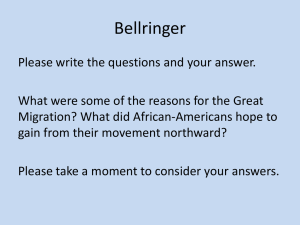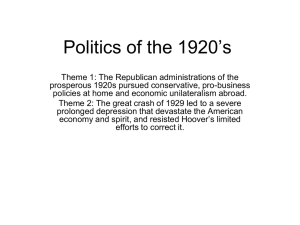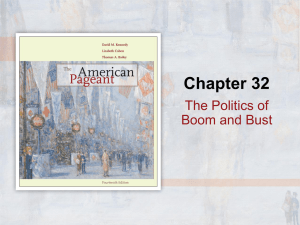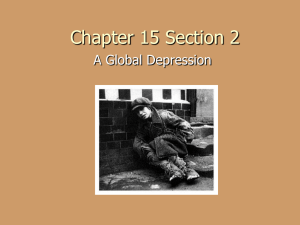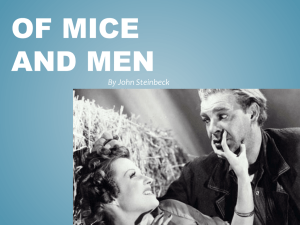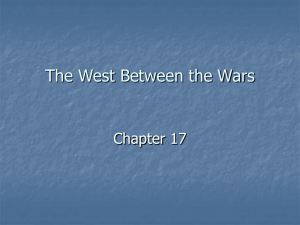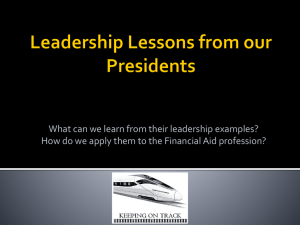CH014Pres
advertisement
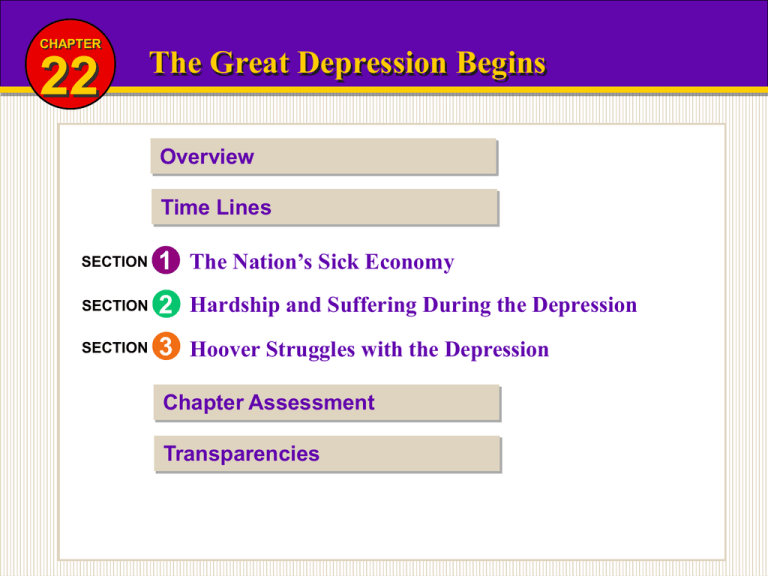
CHAPTER 22 The Great Depression Begins Overview Time Lines SECTION 1 The Nation’s Sick Economy SECTION 2 Hardship and Suffering During the Depression SECTION 3 Hoover Struggles with the Depression Chapter Assessment Transparencies CHAPTER 22 The Great Depression Begins “The illusory prosperity and feverish optimism which marked preceding years have given way to fearful economic insecurity and to widespread despair.” Senator Robert M. La Follette, Jr., 1931 THEMES IN CHAPTER 22 Economic Opportunity Immigration and Migration The American Dream HOME CHAPTER 22 The Great Depression Begins “The illusory prosperity and feverish optimism which marked preceding years have given way to fearful economic insecurity and to widespread despair.” Senator Robert M. La Follette, Jr., 1931 What do you know? • What do you already know about the Great Depression? • Have you ever discussed the Depression with a relative who lived through it? If so, what did he or she say? Read the quote above and answer the following: • What does La Follette suggest about the prosperity and optimism of the years preceding the Depression? HOME CHAPTER 22 Time Line The United States October 1929 The stock market crashes. June 1930 The Hawley-Smoot Tariff Act becomes law. July 1930 Congress creates the Veterans Administration. 1931 Hoover proposes a one-year delay in repayment of war debts and reparations. Between 4 million and 5 million Americans are unemployed. 1932 The Reconstruction Finance Corporation is established. 1933 More than 13 million Americans are unemployed. Average annual income drops to $1,500 per family. HOME CHAPTER 22 Time Line The World 1930 Army officers led by José Uriburu seize control of the government in Argentina. 1931 Austria suffers economic collapse. September 1931 Japan occupies Manchuria. 1932 Ibn Saud becomes king of Saudi Arabia. September 1932 From prison, Mohandas K. Gandhi leads a protest against British policies in India. 1933 Adolf Hitler comes to power. Japan withdraws from the League of Nations. HOME SECTION 1 The Nation’s Sick Economy HOME Learn About economic problems affecting industries, farmers, and consumers at home and abroad. To Understand the causes of the Great Depression. SECTION 1 The Nation’s Sick Economy Key Idea Economic problems affecting industries, farmers, and consumers lead to the Great Depression. HOME SECTION 1 The Nation’s Sick Economy HOME Section 1 Assessment SUMMARIZING What were some of the causes and effects of the 1929 stock market crash? speculation falling stock prices buying on margin loss of confidence Stock Market Crash bankrupt businesses bank failures loss of savings high unemployment worldwide depression SECTION 1 The Nation’s Sick Economy Section 1 Assessment ANALYZING CAUSES How did the economic trends of the 1920s help cause the Great Depression? THINK ABOUT • what happened in industry • what happened in agriculture • what happened with consumers HOME SECTION 1 The Nation’s Sick Economy Section 1 Assessment DRAWING CONCLUSIONS Judging from the events of the late 1920s and early 1930s, how important do you think public confidence is to the health of the economy? THINK ABOUT • what happened when overconfidence in the stock market led people to speculate and buy on margin • what happened when lack of confidence caused people to sell stocks and close out bank accounts HOME SECTION 2 Hardship and Suffering During the Depression Learn About living conditions during the Great Depression. To Understand how people coped with hard times. HOME SECTION 2 Hardship and Suffering During the Depression Key Idea The Great Depression brings suffering of many kinds and degrees to people from all walks of life. HOME SECTION 2 Hardship and Suffering During the Depression HOME Section 2 Assessment SUMMARIZING What groups of people were affected by the Great Depression? How were they affected? GROUP EFFECTS OF DEPRESSION urban poor lived in shantytowns, ate in soup kitchens or bread lines African Americans experienced increased discrimination Latino Americans experienced increased discrimination farmers lost land and headed west unemployed men wandered country looking for work SECTION 2 Hardship and Suffering During the Depression Section 2 Assessment COMPARING AND CONTRASTING Compare what happened to city dwellers and to farmers during the Great Depression. How was it similar and different? THINK ABOUT • what happened to their livelihoods • what happened to their homes • what help was available to them HOME SECTION 2 Hardship and Suffering During the Depression Section 2 Assessment RECOGNZING EFFECTS How did the Dust Bowl affect the entire country? THINK ABOUT • the effect on farmers on the plains • the effect on California and other states where the Okies resettled • the effect on the East HOME SECTION 3 Hoover Struggles with the Depression HOME Learn About President Hoover’s response to the Great Depression. To Understand why the Hoover administration lost public support. SECTION 3 Hoover Struggles with the Depression Key Idea President Hoover tries to restore confidence and halt the Depression, but his actions are ineffective. HOME SECTION 3 Hoover Struggles with the Depression HOME Section 3 Assessment SUMMARIZING What did President Hoover say and do in response to the Depression? “Any lack of confidence in the economic future . . . is foolish.” “rugged individualism” public-works programs HOOVER’S RESPONSES sending of troops against Bonus Army Boulder Dam Federal Farm Board Reconstruction Finance Corporation Federal Home Loan Bank Act SECTION 3 Hoover Struggles with the Depression Section 3 Assessment 3 ANALYZING ISSUES How did Hoover’s belief in “rugged individualism” shape his policies during the Depression? THINK ABOUT • what that belief implies about government action • Hoover’s policies • whether those policies were consistent with his beliefs HOME SECTION 3 Hoover Struggles with the Depression Section 3 Assessment CLARIFYING When Franklin Delano Roosevelt heard about the attack on the Bonus Army, why was he so certain that Hoover was going to lose? THINK ABOUT • the American public’s impression of Hoover • Hoover’s actions to fight the Depression • how people judged Hoover after the attack HOME Chapter 22 Assessment 1. How did what happened to farmers during the 1920s foreshadow events of the Great Depression? 2. Why was uneven distribution of income bad for the economy? 3. What were some of the effects of the stock market crash in October 1929? 4. What effect did the Hawley-Smoot Tariff Act have on the economy and why? 5. How were shantytowns, soup kitchens, and bread lines a response to the Depression? HOME Chapter 22 Assessment 6. Why did minorities often experience an increase in discrimination during the Great Depression? 7. What pressures did the American family experience during the Depression? 8. Why did Secretary of the Treasury Andrew Mellon believe that the government should do nothing about the Depression? 9. How did Hoover’s treatment of the Bonus Army affect his standing with the public? 10. In what ways did Hoover try to use the government to relieve the Depression? HOME
